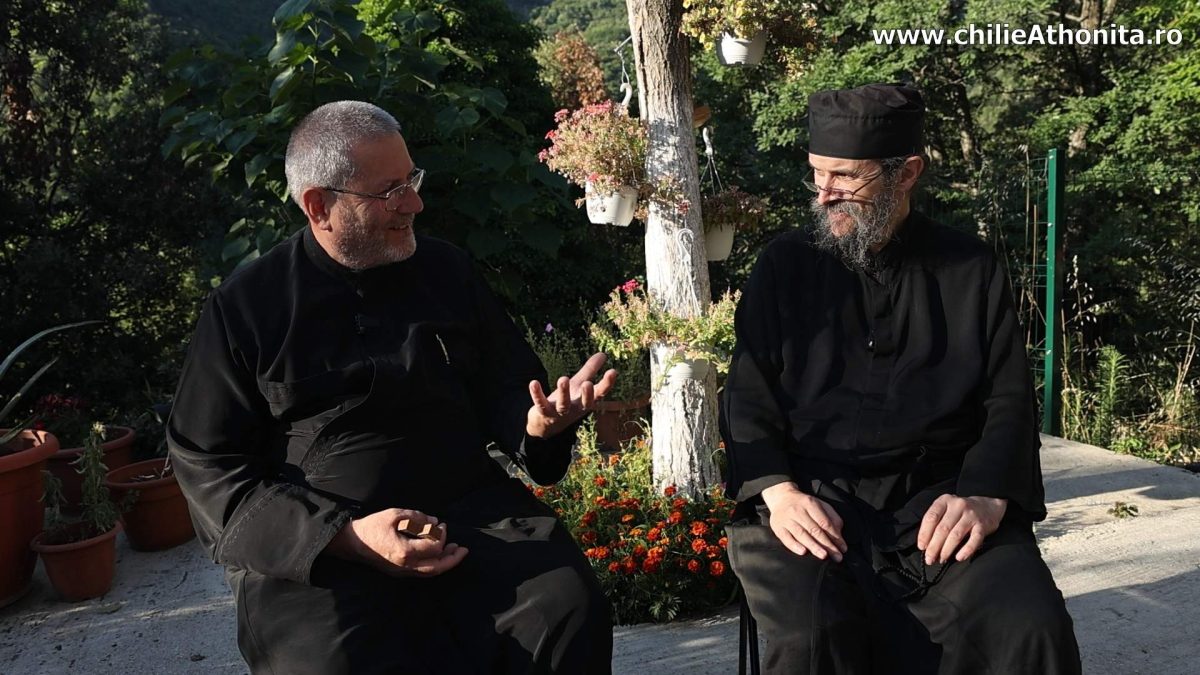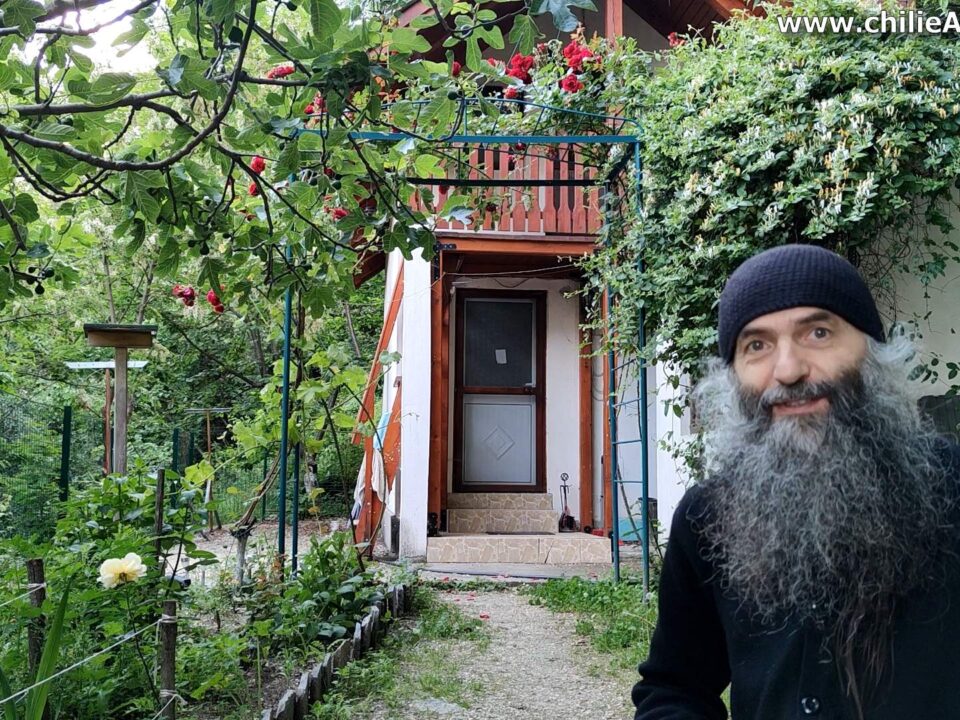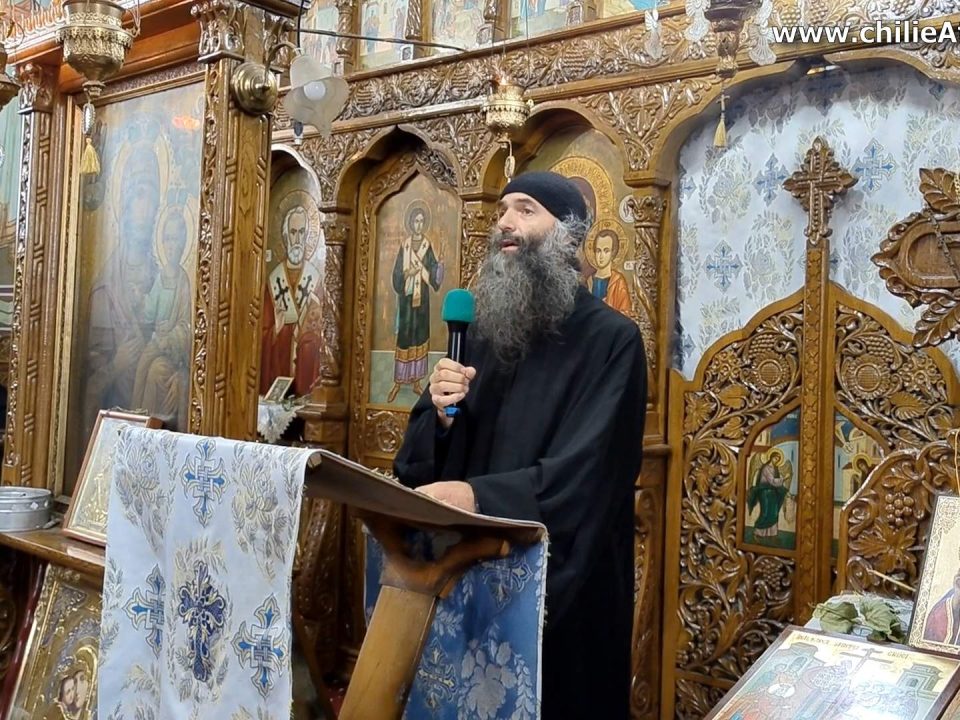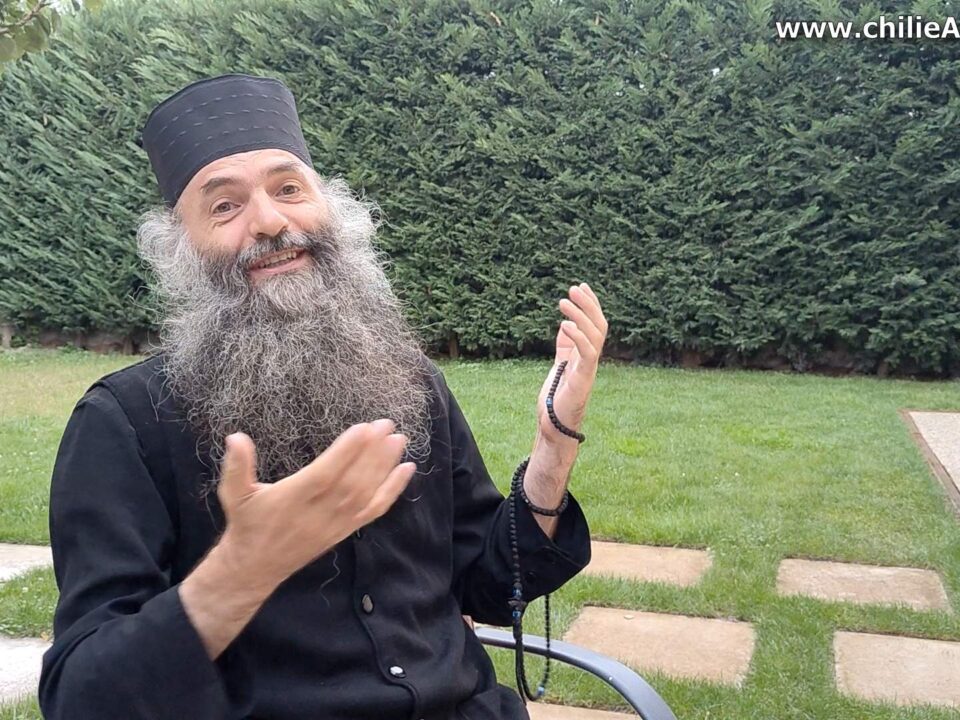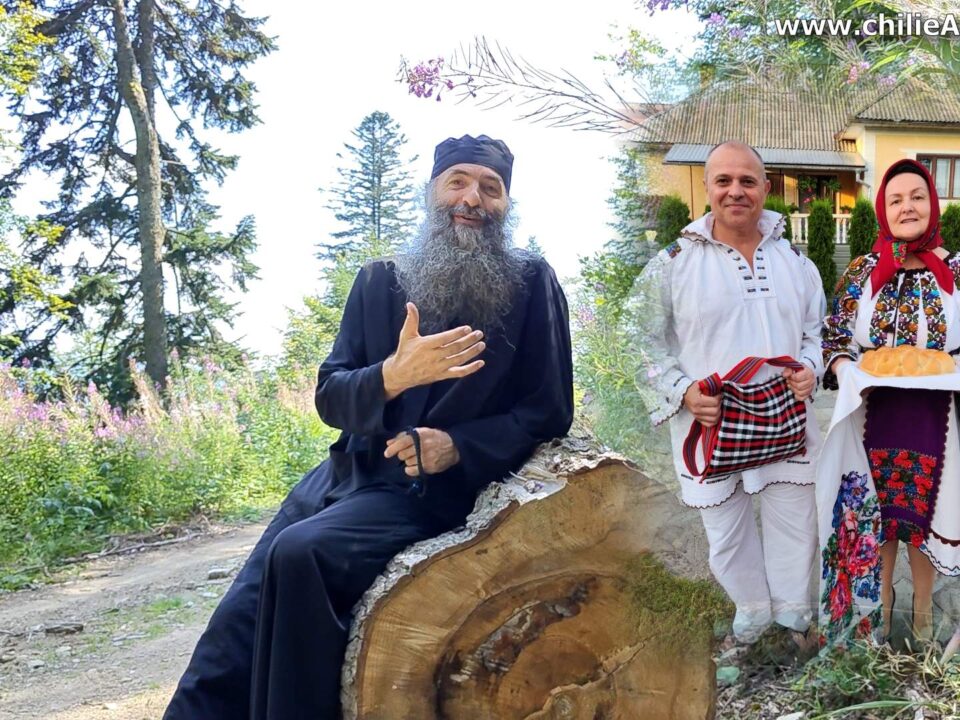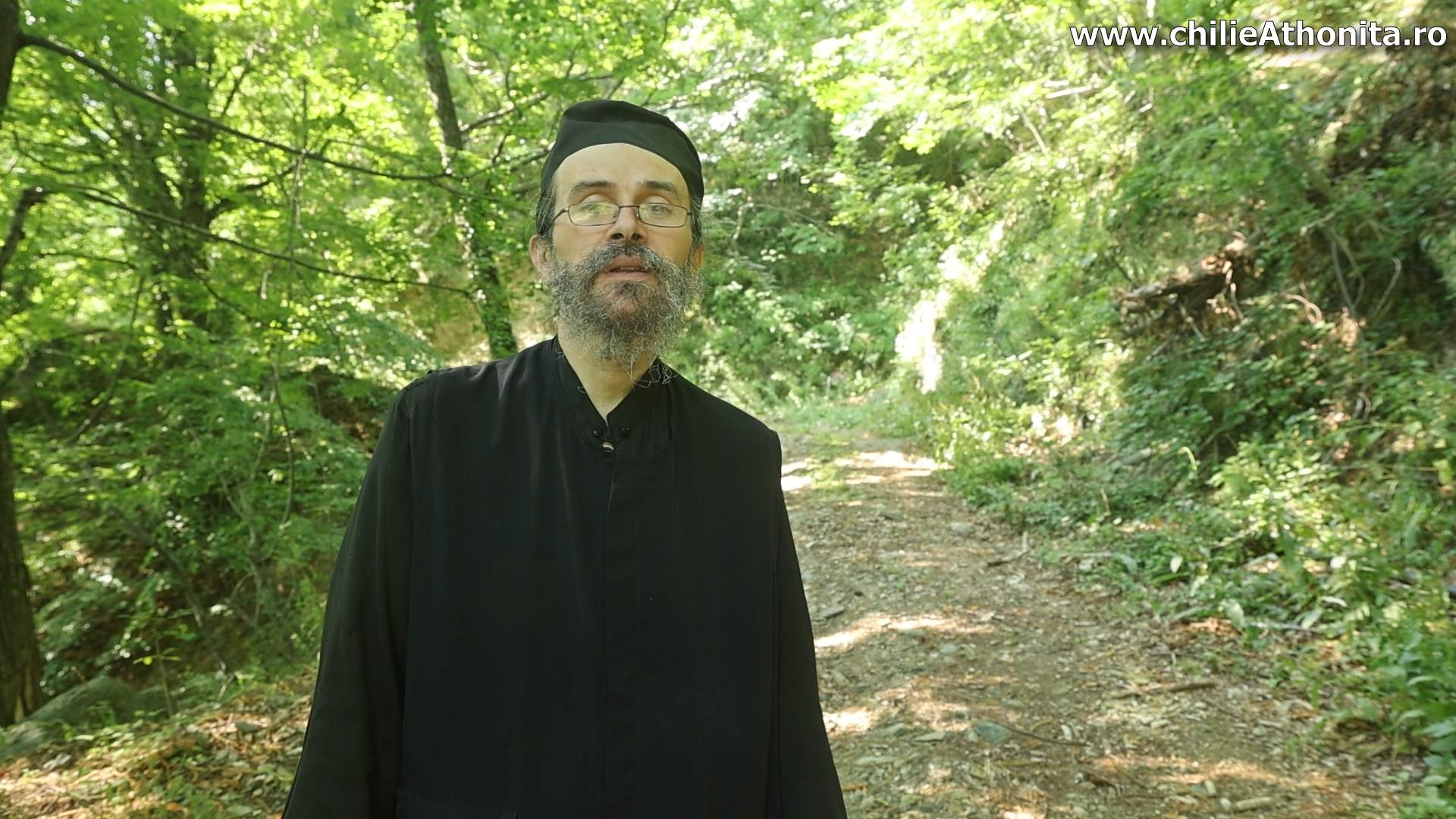
Good and Bad Estrangement – Father Theologos
12 July 2022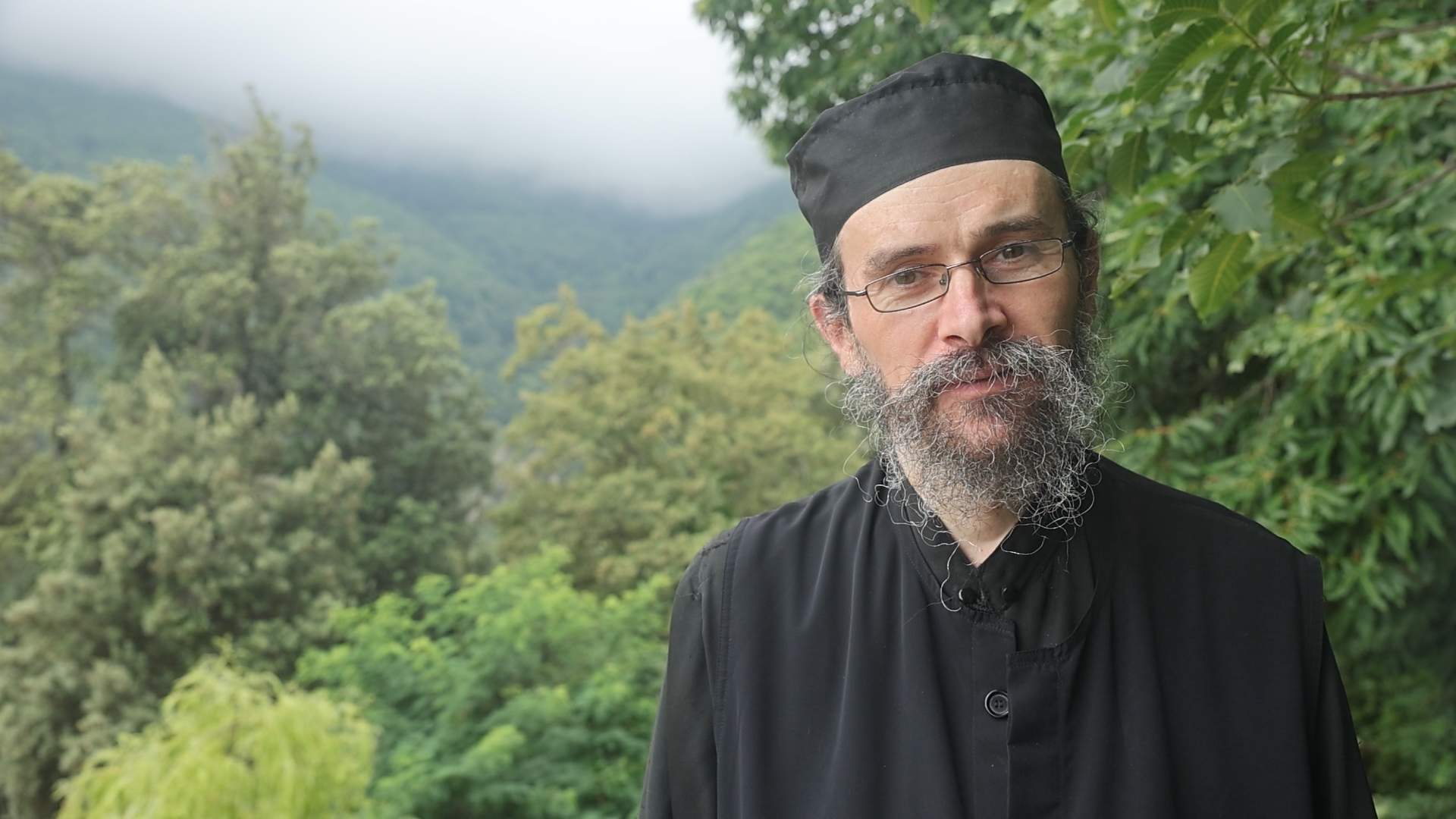
On Dreams, Imaginations and Drugs – Father Theologos
19 July 2022Watch an impressive testimony of Father Radu Brînza, coordinator of “Pro Vita” ( https://provitaiasi.ro/ ), who reveals to us the less seen but no less impressive part that is carried out to save, protect, cultivate life from the first second – from the second of conception – to eternity.
Father Radu presents impressive cases from his experience, cases that show us the struggle of these people, but also the impressive providence of God.
Enjoy!
Father Theologos: Dear beloved, we are at The entrance into the Church of the Mother of God Hermitage with a guest very dear to us, whom Saint Gregory the Teacher, one of the greatest Romanian saints who dealt with the teaching – hence the name of youth learning – brought. Today he is celebrated. We are talking about Father Radu Brînză who is the director, the coordinator of Pro Vita. But before he tells us what Pro Vita means, we ask him to make a prayer.
Father, Heavenly King!
Fr. Radu Brînză: In the name of the Father and of the Son and of the Holy Spirit. Amen.
Heavenly King, the Comforter, the Spirit of Truth, Who everywhere you are and all you fill, the Treasurer of goodness and the Giver of life, come and indwell you in us, and cleanse us from all filthiness, and save, Good, our souls.
Father Theologos: Amen. Glory to the Father and to the Son and to the Holy Spirit now and forever and ever. Amen
For the prayers of our Saint Fathers, Father bless!
Fr. Radu Brînză: With us is God with His grace and with His love of people always now and forever and ever. Amen
Father Theologos: Amen So Pro Vita.
Fr. Radu Brînză: Pro Vita in five words.
Father Theologos: Yes…
Fr. Radu Brînză: Pro Vita is primarily the work of the Church. This for us is very important because we are nothing but a part of the missionary activity of the Archdiocese of Iasi and it is a precious truth because this means that the Church as the Body of Christ assumes directly, explicitly and intensely, this reality of life – the most beautiful gift from the good God.
Father Theologos: Before proceeding, you should know that we are very happy with this because indeed there were accusations against the Church that it is somewhat cut off from reality, torn from the daily routine and so we are very pleased that the Church is indeed involved and especially with the blessing of High Theophanes.
Fr. Radu Brînză: This is the second precious thing for us: the fact that everything we do, we do with prayer and with obedience and with blessing, because there when something is said only by one can be precious, but it is also risky, but when it is said by one, but certified by two, three others, then it becomes a plenary truth, a truth that is certified by many minds and souls.
And then, the fact that we sit down on prayer and that everything we do is with obedience and with blessing, keeps us in the natural course of the work of our Church.
The third thing, that mission statement – who we are. It is very important for us to have the self-awareness of our work because otherwise, we can work with some vague ideas that go into dissipated actions and come out as a spread of cartridges in a thousand and one meanings without any target.
Father Theologos: That’s right… It’s good to be focused, with care.
Fr. Radu Brînză: Exactly then, for us, our mission statement, our deep creed is contained in a single sentence: salvation, protection, cultivation of life from the first second to eternity. For me, the work of Pro Vita begins in that wonderful second given by the good God when he decides that the two human cells should catch this form of life of a new human person until, if you will, a 7-year-old parastas for someone who has left. It’s also a pro-life path.
But obviously we start with the first second.
Father Theologos: Yes, yes. Tell us a little more.
Fr. Radu Brînză: And then, this Pro Vita work that is contained in this phrase is the fruit of an endeavor of my colleagues, an endeavor of almost 2 years. And I remember fondly: they were one evening somewhere, in a park in Cluj, looking to understand and we all wanted at first to understand what Pro Vita is and they called me arguing in a park in Cluj on a word, on a meaning. They had not reached a conclusion.
That’s why, in addition to giving us the direction, showing us who we are and living, we really breathe this truth of our activity, but it is also precious because it is the fruit, the work, the effort of about 2, 3 years of the people who really tried to understand. OK, we do the work, but what does Pro Vita mean?
Father Theologos: Yes. I think it is very important this synodicality of the Church, the synodicity of the Church, I mean, together-work, speaking in more secular terms and beyond that, the focus …
Fr. Radu Brînză: Exactly.
Father Theologos: On this protection, on this inestimable value of life, starting from the zero second, reaching birth, continuing with death and then in eternity. Tell us a little bit about the concrete activities between conception and childbirth. How Does Pro Vita help, pregnant women or…
Fr. Radu Brînză: But I still have those two, can I tell them?
Father Theologos: Say, yes! Of course! Please forgive me!
Fr. Radu Brînză: I said there are five.
Father Theologos: Five. Forgive me! Yes.
Fr. Radu Brînză: Very precious and on the same level. So I’m in the Church. We are under obedience and blessing and sat down for prayer. We know who we are – mission statement – the value of the team. The team building we do every day and I remember the Rapid football supporters hymn: “We have team, we have value, we are the coolest team”.
Father Theologos: Oh, nice yes…
Fr. Radu Brînză: It is very important for us and we cherish. And I think in a way, if I’m going to talk in a leader’s terms, if I were to be a leader….
Father Theologos: Well, you’re…
Fr. Radu Brînză: Yes, but let’s see… I do not have a desk in my office, I do not have a chair and this is because in our organization, Pro Vita is not only said, but also done, all my colleagues with whom I grew up together in this team were married and gave birth. And it’s absolutely dear to me when I go to the office not to find my place, to find one child in a copier box, he sleeps, another one is in my chair, another one changes pampers on another desk. Not all day, but that happens too.
Father Theologos: Oh, so you’re a big team and a small office.
Fr. Radu Brînză: Yes, exactly, yes. Big flower, small pot, we say. And then, what’s important to me as a department coordinator is that I love the team very much, I have full confidence in them, and we counsel each other completely. Nothing pyramidal works for us in this sense of the father who knows them all, but simply, we have people specialized in various directions.
I am again very glad as a coordinator that there are many things that I have no idea about. In the sense that I don’t want to go into details because it would mean, it would feel like I’m trying to control it, I’m teleguiding, say, my colleague, which would not be fair.
Father Theologos: And that gives you a lot of flexibility and a fast response time.
Fr. Radu Brînză: Yes, and especially it also gives me a state of comfort to drink my daily coffee quietly or in the sense that I have time for other things. So this is the fourth and fifth again very important: it is a semi-personal work, it is the work of my family, of my children, of my priestess, of all of them. It’s all extremely familiar and personal.
I want to tell you one thing: the team of the Pro Vita department – we meet at the christenings, at the baptisms, at the birthdays, at various house consecrations. Obviously, we are all in 5 minutes after the work, what do we do? We are starting a Pro Vita project, but spontaneously, it comes to us, that is, we live, we breathe…
Father Theologos: Glory to God! Yes.
Fr. Radu Brînză: Which gives great joy.
Father Theologos: Of course. So it’s about personalizing your activity and expanding your spirituality into activity and activity in spirituality.
Fr. Radu Brînză: Exactly, yes… Try. These are the five pillars of our work…
Father Theologos: Yes. May the good God help! You must know – a very small parenthesis – that these five pillars are basic pillars and some of them, unfortunately, apart from the archbishop’s blessing and obedience to him which is the most important pillar – are found in the top management of the top companies… I know a case of a very high-performance company in electronics, a company that makes lenses, it’s called Sigma. It’s one of the best optics company at the moment and it has exactly the same principles.
So it’s about the company as a family. It’s a big factory, small offices. It’s about delegating responsibility to specialists, to those who really are good at it, and of course, from there on out the theme of prayer and the theme of the others, unfortunately, they are Japanese, is debatable. But I want to say that even the Japanese have realized about the importance of value management and value can be none other than the amount of Christianity in everything. Good, by Pro Vita…
Fr. Radu Brînză: Activities. I would go in the core.
Father Theologos: Exactly.
Fr. Radu Brînză: Because if we presented these 5 points, we see that the mission statement is in the middle and it gives us meaning.
Father Theologos: I forgot to say about it as well. So about Sigma, they’re very focused, they know very well what they’re doing and they’re not spreading, they don’t want to do everything for everyone and eventually end up doing everything for anyone and nothing. Continue.
Fr. Radu Brînză: Yes and it’s important because we really try to stick to this “Salvation. Protect. Cultivating life” because it’s really the risk of dissipation, but at the same time, what’s nice is that when you go to the edges of activity, at some point, from the outside you can’t see the connection. Kidding… if now you’re going to see me with a bike spinning around here, you know it’s definitely related to “Saving” or “Cultivating”… But in fact, the things that are in the margins at the moment, when you look at them as a whole, are part of a puzzle, that is, they have a connection.
It is very important that we do not dilute ourselves, because you can go in the direction of Bucharest and get to Suceava. You reach a destination, but not where you need to be, not where you want to go. That when it comes to saving – saving life, the first problem we realized. Obviously there is the wonderful second, the mystery of God. No one still understands why technically speaking, yes, the two cells come together, but it is not understood yet and it’s good, probably will not find an answer, why here, now.
Because a man and a woman can meet intimately, everything happens naturally, they are physiologically compatible speaking, but not now, not in this meeting. Why in this and not in the other – here is the mystery and the beauty.
I understand, however, that the big problem is when the miracle from God occurs and the problem of risk arises. It came in the wrong moment, it came too early or too late, it may be medical problems, the medical introspection, the medical performance that goes on DNA research has a lot of good parts, but it’s also that risk – not from the research itself -, but from our interpretation that… “oh, it might have this disease and then, come on, let’s extirpate, let’s get out what God put there.” I won’t go into details. Sometimes it is a false diagnosis, sometimes it is a real diagnosis but it produces some extraordinary spiritual joys.
Very briefly, I have in my heart the image of a mother who gave birth, technically speaking, medically, gave birth to a monster: a little girl with a hideous face, could not communicate because she lacked the means, the family was warned that such a thing could happen, they assumed – it was not easy, but they assumed – and gave birth. The lady was talking about her little girl!
Father Theologos: Glory to God!
Fr. Radu Brînză: And it was admirable that – again technically, medically speaking – this case, this pathology had a survival rate up to 40 years. Well, it’s martyrdom, it’s savior that you don’t extirpate, but you assume a 40-year-old cross that beware: one of the arguments that led to extirpation was – sir, you won’t have time for these already born children that you have and then you’re going to miss their education. They couldn’t do it.
Father Theologos: Glory to God!
Fr. Radu Brînză: She gave birth. The greatest joy and that lady when she spoke, her face was filled when she said that after 6 months, the little girl smiled at her.
Father Theologos: Glory to God! How beautiful!
Fr. Radu Brînză: She only lived for a year and made her funeral. And they have her in their family and another saving attitude because, ok, we’ve taken it all this far, what do we do with the next tasks? Mentally speaking, a lot, 99% of women would have been scared. “I pulled it off, but I don’t need it anymore. IUDs, condom, asceticism or other solutions, I don’t want to anymore.”
They have three more children!
Father Theologos: Glory to God!
Fr. Radu Brînză: Healthy children. But forgive me, I got too into this detail, I close the bracket. And then we try, when we talk about saving life, it’s the segment of activity that looks at intrauterine life until birth.
Father Theologos: That’s right.
Fr. Radu Brînză: And we try very hard on the exercise line that we have to make it smaller, but without touching it. And we’re trying to do this thing, which is, we’re trying to show not how ugly abortion is, how hideous it is, but to show how beautiful the birth and life of the baby is, and we’re looking not to impose a particular point of view of ourselves, but to present good parts, bad parts, respecting freedom.
So my duty is not written battalions against those who accept abortion, nor against those who do not accept abortion, but to show, as God teaches us: “Behold, the way! Tight, with asceticism, with effort, but with much joy or extremely easy, wide, which takes you into the trees, into the hole.”
And that is why the key word for us, when it comes to saving life, is education: to say and tell the young and to tell the elderly and to warn. Again, it’s very important, although we don’t succeed very much, but we care a lot about one thing: working with the young man exposed to hyper-sexualization and the risk of killing his children, of starting his life with the killing of his own child, because we work with families who get stuck on some clichés and on some false targets: first business, first social achievement and then, child. And a lot of times you accomplish them and the child doesn’t come in anymore and we go into other psychoses.
But beware: let’s also work with the woman who has already aborted. And post-abortion counseling because the tragedy that happened is enough, and even she’s Abraham’s daughter and we’re looking to get her from there.
But one thing – and here is a treasure trove that we have and that I think it’s time to exploit properly. The treasure is precisely the woman who went through the abortion. The two of us can talk until the day after tomorrow about abortion, beautiful, brilliant, terrible, we will not have a great effect… not as much effect if here you had a woman who would cry for the child she has… I once had the case of a lady who confessed an abortion. And who said that every year, on the day she killed her child, she had the same dream: the child on a tram, she saw him, she rejoiced, she wanted to take him, the tram left. And it was terrible that every year it happened, every time the tram would leave and in the tram the child grew up.
Father Theologos: Glory to God!
Fr. Radu Brînză: Well, when a woman comes and tells you on her own experience, on her own pain… woman who after 40 years – a case, otherwise very well placed, to say, which I have been confessing for over 20 years – and one day came: “parent, I cannot anymore!”
Father Theologos: Glory to God!
Fr. Radu Brînză: She took out from her soul the pain of killing. That’s the word, and that’s really what the Fathers of the Church teach us: let’s not give satisfaction to the enemy! It’s not our job to… God judges him. I want to get it out of there. That too might be that he may be before the good God more martyr than I am who stand preciously in my principles that I do not break… I don’t go into discussions, into the details like these, but education by saying how beautiful life is, saying, when appropriate, and how tough abortion is.
You forgive me, I cannot say another example, I know a doctor who does not perform abortions, gynecologist, because he promised his wife also a doctor. Why? The wife-doctor when she was a student had to, in the 6th year when the obstetrics and gynecology module is done, attend an abortion. It was a technical procedure, yes. She had to, as a future doctor, participate in that procedure. It was probably an aspiration abortion and dear her, the doctor told how she had blue, delicate, beautiful shoes and everything was fine and beautiful until when everyone was watching what was going on there, she woke up on the lovely blue shoe with the baby’s hand.
Father Theologos: God forbid!
Fr. Radu Brînză: And she said to her husband: do not ever dare to have an abortion! And he does not dare.
Father Theologos: Glory to God!
Fr. Radu Brînză: Yes and there are many of these… we’re just talking about that, and that’s more redeeming than we hope for. So that’s basically.
We go on education, I don’t go to what we’ve done – there are some achievements, but here we’re looking: through public events, through conferences, through this, through the media, through an event like that, to say the least. For the rest, everyone positions himself according to his power, as he thinks.
Father Theologos: I think a woman who has an abortion has a lot of pain inside of her, right?
Fr. Radu Brînză: It’s terrible, yes. Sometimes, they’re so stuck that they don’t even realize it.
Father Theologos: Yes…
Fr. Radu Brînză: I mean, it’s that state of shock in which they sometimes die in this state. They’re so stuck. Yes, we here must try to help them be able to cry.
Father Theologos: Yes, yes… So it’s a state that lasts for years, it can last for years, yes…
Fr. Radu Brînză: At some point you have a tough person in front of you, you never know who you have in front of you… Father Theologos: Yes, right, yes…
Fr. Radu Brînză: And you say it’s the thrill of the world and that person, dear her squatting with fear or vice versa, you know.
Father Theologos: Yes, yes, yes
Fr. Radu Brînză: Yes. When we talk about protecting life, we are already dealing with the child who was born.
Father Theologos: Forgive me, a little bit, I want to ask you: at this time it is in the United States, as far as I understand, a great debate due to the fact that there, the Supreme Court ruled that every state in the United States should …
Fr. Radu Brînză: It balanced the Roe versus Wade case.
Father Theologos: Exactly. What can you say about it?
Fr. Radu Brînză: What to say?… It’s good that…
Father Theologos: I see… you see what a society without values means. So people have no idea where they’re going…
Fr. Radu Brînză: Yes, but you can see that it reaches that natural moral law…
Father Theologos: Exactly, yes.
Fr. Radu Brînză: You can see that in a society without values, you still reach values…
Father Theologos: At the value of consciousness of what nature says.
Fr. Radu Brînză: This beginning of balance in the other sense that occurs in the United States is, I think, part of this natural moral law that cries out in us.
Father Theologos: Exactly…
Fr. Radu Brînză: It will last. They are the consequences of maybe a lack of genuine and deeper involvement that maybe we haven’t done or aren’t doing, and here we have to have the strength to say: that’s what I’m doing, that’s what I’ve never done. Not in terms of putting up the wall because of it yours or mine.
Father Theologos: That generates hatred.
Fr. Radu Brînză: Yes, yes. But let’s get into that humble state where the cart broke down. Come on, let’s fix it together!
Father Theologos: Exactly.
Fr. Radu Brînză: That way, if we kick in the faulty wheel, we do not go further.
Father Theologos: We come back to protecting…
Fr. Radu Brînză: Protecting. Well, here’s another thing about… I go back a little bit to the intrauterine. Not just to not kill him, but also to protect him. St. John Chrysostom has a very beautiful image of the pregnant woman. It’s the ship in port.
Father Theologos: Glory to God! How beautiful! Yes.
Fr. Radu Brînză: And the saint says that when a woman becomes pregnant she must be away from the waves, from the tumult. Not for her. For the child who is in the womb and has caught my attention over time, I understand why. A pregnant woman if she is under the canon, she is not allowed to take the Holy Communion, yes, 7 years you are not allowed. If she gets pregnant, she can take it. After giving birth, she resumes her canon. But during this period, for the baby in the womb.
Father Theologos: Glory to God!
Fr. Radu Brînză: So why? Because look, again, I go back to as much as I’ve read before, I’ve seen about the medical performance that comes in and shows that in… – I was reading somewhere that the child in the mother’s womb identifies the father’s voice eight days after conception.
Father Theologos: Yes? But surely he is influenced by the feelings of his parents and lives…
Fr. Radu Brînză: Yes… The baby is fooling you from the tummy. Education starts from that second, yes, and he’s making some of these things that he can manipulate you emotionally when you don’t even know. Yes, it’s a very beautiful, intrauterine world, but at the same time, that’s why I say it’s necessary because in the attitude that you have as a pregnant woman or you as a society when all the positive or negative attitude goes right on the baby.
And we had one of the most painful cases. Child who lived three days and in these three days had about nine surgeries, I don’t know how many diagnoses, but that’s because he came from a relationship, how can I say? Yes, relationship… in which the lover, that they were not married, the one who was the biological father, in an excess of anger, killed the two-year-old child, striking him against the walls, he was drunk, because he got annoyed by the child.
And the entire intrauterine period of the baby who lived only three days and died after nine surgeries was a pregnancy with threats, only with “I kill you when I get out of prison” and so on. And all this went to the poor baby.
Father Theologos: God forbid!
Fr. Radu Brînză: Yes!
Okay, the baby was born. The protection that begins in the intrauterine period, not only to keep it, but to keep it properly in the womb and when he got born, that’s when we put this period in the Presidio program. It sounds so nice. I put it under the care of the Mother of the Lord.
Father Theologos: Let the good God help! Mother of God, dear her!
Fr. Radu Brînză: Yes. And that’s where we’re trying to… It is a counseling program against abortion or not to cause abortion, to preserve pregnancy. Why was I saying of importance?
We have some techniques, my colleagues have them, to analyze that case. We always put at the center of the problem: the mother. And then let’s see: what’s coming over you, Mom? Okay, do you want to have an abortion? Why do you want to have an abortion? Because: I do not reconcile, I have no job, I argue with the boss, the crisis in Ukraine, global warming and so on.
And we try, behind every problem, to have a solution. If there’s a problem of bad atmosphere in the family, with violence, we have friends, lawyers, police, we work with institutions. If there are payroll problems, we don’t have high salaries behind us, but we can mediate, that is, try for any problem to have a solution.
Father Theologos: Very important that you start first of all with education because that’s very important. Other structures give a little aid and that’s it. That’s not how I think the human problem is solved. Indeed, the human problem I believe is solved first of all through education, and as a side effect of this education, on the second plane, there will also be material, legal or other aid.
Fr. Radu Brînză: I don’t want to influence you, I don’t know what thoughts you still have with me, but I would like you to ask me the following question sometime: why would someone give you money?
Father Theologos: Why would anyone give you money?
Fr. Radu Brînză: Not now.
Father Theologos: Not now. Okay, there you go. Yes.
Fr. Radu Brînză: Later.
At present we are glad to have, for example, in each county center, the Archdiocese has three counties: Iasi, Botosani and Neamt. In each county capital, we have by the benevolence of our metropolitan father His Eminence Theophanes who supported us and supports us in this work, we have an apartment that is dedicated to the woman in crisis of pregnancy.
I should not have talked about it, because we try to keep it as the ace up our sleeve, as the solution in the extreme situation. Why? Because actually, this apartment is when we see that the woman doesn’t even have anywhere to stay. Okay, don’t abort him, bring him here because look, I’ll give you home, a meal and we bring her there, we take her out of the toxic environment that she’s in to create an environment that allows her to keep the baby, but also her comfort and her future. And while she’s located in our apartment, we work and the baby is born and we want it to go home. Why? Because no matter how good the conditions are with us, the meaning of life is not to stay in our wonderful apartment, but to stay in her wonderful home, in her wonderful family.
Father Theologos: That’s right…
Fr. Radu Brînză: That’s why I was saying it’s a solution. But from this reality, we are now in a next stage. We are trying to have, to build some maternal centers, centers for the woman in crisis of pregnancy, with all the rigors, with all the scientific, social acrimony…
Father Theologos: With a global vision of a favorable environment…
Fr. Radu Brînză: Yes and in a correct coordination with the other state institutions because we do not try to do more than something else does… There’s a risk here, I noticed, in the desire to do good: I do my good, you do your good, the other one does his good, and among our good creeps very elegantly the nefarious work.
Father Theologos: Yes…
Fr. Radu Brînză. It slips through our fingers and then it’s good that what I can do and what you can do and we put the 5 -7 as we are, to the glory of God and to the joy of those next to us.
Father Theologos: Yes.
Fr. Radu Brînză: We try. If God blesses. And then, I repeat, if to the rescue, the key word is education. When protecting, the key word is presidium, protection…
Father Theologos: A kind of tutelage…
Fr. Radu Brînză: Yes, the cultivation or improvement of life. I’ve noticed that there are families who have it all, they live well, they live decently. I remembered when we talked before, that the St. Stelian program – here’s the key word. We put the family under the protection of St. Stelian because these families, many of them live in a decency. Sure there are problems, but not only here. There are families with 10 children who are poor, but they bring you ten more families with one child, who are poor. Therefore, you see that poverty does not come from how many children you have or how many children you do not have, but it comes from how you relate to values, to meanings of life …
Father Theologos: Yes, behavior…
Fr. Radu Brînză: Exactly, yes. And when we talk about the St. Stelian program, we are talking about the family that we are trying to help in the good that we do anyway. I mean, it’s kind of like putting a little bit of good to the good that is.
This program has several components. One is: we invest in education. Behold, we are in the school scholarship campaign and we also thank the Holy Mountain Athos who help us…
Father Theologos: Well, from the Mother of God.
Fr. Radu Brînză: The Mother of the Lord in the Holy Mountain through the dear people here. I noticed that these families also have a lot of performances: I saw houses, I visited these families in the archdiocese. Where you do not expect it, you find impeccable, beautiful houses, you can find diplomas with Olympic children, with national or even international champions in sports disciplines…
Father Theologos: Glory to God!
Fr. Radu Brînză: With young people who want to go…, they have beautiful dreams. And we try in this…
Father Theologos: And they can’t, materially speaking.
Fr. Radu Brînză: Yes, yes. And they are capable of an extraordinary sacrifice. A child, a young man who lives far from Iasi, wanted to enter Architecture. For this he needed meditation that was done two, three times a week. Each time, he would go for each meeting at the meditation, 170 Km.
Father Theologos: Glory to God! Mother of God!
Fr. Radu Brînză: And he succeeded!
Father Theologos: Glory to God!
Fr. Radu Brînză: And he is a student and wants to make his own architectural office and I think the good God will help him. He comes from such a family.
Families with many children, most of them are not poor. But the big problem of the family with many children is social depreciation, it is putting up the wall – you are weird, you are anything …, you are inculcated, it is not bon-ton, it is not chic to have so many children.
Father Theologos: The good God forbid!
Fr. Radu Brînză: And people carry this burden.
Father Theologos: Stigma
Fr. Radu Brînză: Although a child from a large family can have an absolutely remarkable character. And again, I go back to a beautiful statement that a young woman who came from a family with 10 children and who said that in a family with 10 children, your joy multiplies 10 times and you have whom to tell your trouble. And a family with many children is one where you can learn what solidarity means, enjoy what you look at, be calculated because you may not receive the invitation to the table twice.
I remember a mother who said that she daily—a person who carried out work like this, was a janitor—and what she said, she said with joy.
Father Theologos: Glory to God!
Fr. Radu Brînză: Attention! With joy! But she said it this way: my concern is that every day at noon I have to put on the table 15 loaves of bread and a pot of 20 liters of soup…
Father Theologos: Janitor…
Fr. Radu Brînză: Yes.
Father Theologos: Glory to God!
Fr. Radu Brînză: And asking her: what’s the joy? Joy is when I see everyone coming home.
Father Theologos: Yes, from God, yes…
Fr. Radu Brînză: Yes. You learn altruism, you learn solidarity, you learn to share joys, you learn to mediate conflicts.
Father Theologos: Yes. How is it mediated…?
Fr. Radu Brînză: Yes, family mediation was also here. Of course, the mother intervenes, but between us, who are older, we have to clean the room as I say in the countryside. And that’s where they go and solve. Obviously, not through violence, but by talking.
Father Theologos: Discussing…
Fr. Radu Brînză: Finding the common points.
Father Theologos: Glory to God!
Fr. Radu Brînză: That is why, for us, the scholarship program is extremely precious. Why? That they’re not social scholarships. Not that they’re not useful, they’re certainly good and that. But we’re talking about something else, they’re different themes. Those with the social… And as much as we can and glory to the good God, we try.
We had situations where the father overturned with the tractor, died and there were 9 children and his wife left.
Father Theologos: The poor man…
Fr. Radu Brînză: We had open heart surgery, we have children with disabilities and with many problems like that. We try, we don’t solve everything, but we try to do everything in solving the problem.
Father Theologos: And I think children are aware. So it’s really developing from a personal point of view, it’s really learning, it’s really…
Fr. Radu Brînză: Absolutely, absolutely… And these are vocational scholarships because we encourage them to follow their dream. We put, God, from here he will ordain, but this drop of good that we are trying to put in these families, we hope… Let’s dream a little bit, but what if this is where the future Prime Minister of Romania who will take Romania is born…
Father Theologos: Let the good God help!
Fr. Radu Brînză: … ahead of the United States.
Father Theologos: No… the direction is not good.
Fr. Radu Brînză: As an economic performance or…
Father Theologos: That’s right…
Fr. Radu Brînză: I’m not kidding, you know…
Father Theologos: Yes
Fr. Radu Brînză: The experience so far shows me that we have as a nation a terrible charm, but we are disorganized.
Father Theologos: Yes…
Fr. Radu Brînză: If on this charm, on the Charm of the Romanian you would put the Western rigor.
Father Theologos: Western seriousness.
Fr. Radu Brînză: Seriousness, yes, we would be ahead…
Father Theologos: Yes, sure, sure, I absolutely agree and I’m very optimistic, if we manage to empower that.
Fr. Radu Brînză: Yes. So in summary about these: saving, protecting, cultivating, we have education, we have presidium… Oh, and it’s very important regarding another dear project is called “Gift for children” (DPC) in which we, what this large family wants, we come up with its specific need. That is why in this project we can build a house or buy three chickens. What’s the point?
We put what man lacks. They might say: father, if I buy three more chickens, I’m much better off, that’s what I’m missing for now and I’m gladly taking those three chickens. Or if he tells me: look, I’d need a new home. We’re trying to make that house. And you know how much joy I had?
Father Theologos: Glory to God!
Fr. Radu Brînză: When women, mothers with 9, 10, 11 children who finally have a sink, have a washing machine.
Father Theologos: Glory to God!
Fr. Radu Brînză: We have another project, there are several project activities. One is “Letters to Santa Claus.” Well, Santa Claus really comes to us, yes and we send… Thanks to the reindeer behind who make it possible…
Father Theologos: Who pull the sled…
Fr. Radu Brînză: Yes, who pull the sled, yes. The kids even write letters for Santa Claus.
Father Theologos: Glory to God!
Fr. Radu Brînză: And know that Santa brings them exactly what he writes there.
Father Theologos: Yes, because Santa Claus being the good God, He gives into the hearts of men this disposition of mercy.
Fr. Radu Brînză: But listen what a child can write: I want a washing machine for my mother.
Father Theologos: Glory to God!
Fr. Radu Brînză: And Santa brings, yes.
Father Theologos: Glory to God!
Fr. Radu Brînză: And sometimes Santa also brings water to the houses and so on. That’s why I was telling you that this gift for children and the scholarship program – all under St. Stelian – like the others we put under protection, are our joy, our meaning, our direction, our enthusiasm in what we do.
Father Theologos: Up to what age does Pro Vita stop?
Fr. Radu Brînză: Up to 7 years in eternity.
Father Theologos: I understand…
Fr. Radu Brînză: Yes, the basic idea is not to disappear… It’s not about age, it’s about family…
Father Theologos: Yes. I notice, you forgive me…
Fr. Radu Brînză: That so many attack are at the moment… The hypersexualization that we see everywhere.
Father Theologos: Terrible!
Fr. Radu Brînză: It is actually an attack on the fundamental institution that is the family.
Father Theologos: Yes, and not only hyper sexualization, but all the sexual distortions themselves that are promoted.
Fr. Radu Brînză: Absolutely, yes, yes. Painful.
Father Theologos: So you are actually focused on the first part of human life, that is, on the intrauterine, childhood and adolescent side so that the child receives a good…
Fr. Radu Brînză: Yes and as long as it is needed. So we at Pro Vita can talk, look, I said before, we still don’t value enough what we set out to do – yes, now you ask me the question of why someone would give money, they would invest in us.
Look, an 80-year-old woman can be both a resource, but also a case that we solve because we heal her pain. I met a woman at 80 who doesn’t forget her abortion 60 years ago…
Father Theologos: Poor…
Fr. Radu Brînză: And she always cries, dear her. How can I make it from the dead alive? Sure, Christ does! The good and the Savior and the Mother of the Lord.
Father Theologos: Yes! And people work together.
Fr. Radu Brînză: But also, through these works on the principle of who does like me, like me to suffer. Many times, I encourage and even ask the fathers to give canon, as we say, the correction of the woman who went through the abortion. Not that it wouldn’t be good, fathers sometimes say: look, dress a troubled child. It’s also good that you bring joy, you bring a smile to a child who can heal the tear… the child who you decided to die.
But to these advice, I insist on this one: tell your pain of another.
Father Theologos: Exactly.
Fr. Radu Brînză: Say it like that: look at me! And I often say to women in this situation: they don’t have to get on the tram (and say) hello, I, you know what, I’ve had an abortion, it’s terrible. Not! We lose meaning, it becomes frivolous.
But when you see a woman in the watershed, pull her by the hair and tell her look at me that I’ll tell you what happens if you choose that.
Father Theologos: Yes, exactly. So, to give testimony!
Fr. Radu Brînză: Exactly, let it be her testimony. I have to say this, forgive me!
Father Theologos: Necessarily.
Fr. Radu Brînză: And I say it with… although she no longer lives, but I say it with the blessing of the dear artist, you know her, the artist Cristina Stamate, you remember her dear. She does, if you will, even today, missionary work. And it does it now, and I’ll tell you why.
She had a testimony. God made us meet. Don’t ask me how, I don’t know, the fact is that we didn’t know each other, we talked on the phone, it was a thing of understanding from the first second. We met and – I’m allowed, she spoke on record – she talked about her story. She was not married, had no children alive.
She had only one child that she killed by abortion.
Father Theologos: God forbid!
Fr. Radu Brînză: But why is it important to remember? Because it’s about the person and the saving work.
Father Theologos: Yes
Fr. Radu Brînză: Do not leave the sinful person in the clutches of the enemy, get him out of there!
Father Theologos: Exactly.
Fr. Radu Brînză: Scorched, hit
Father Theologos: How it’s like
Fr. Radu Brînză: Get him out of there because it’s not the devil’s business with him. Leave it that way, but it’s mine. It’s Christ’s.
Father Theologos: Yes.
Fr. Radu Brînză: Young, beautiful, with perspective – the period when “you are a fool if you have children”. It was that period that encouraged, Marxism, not neo-Marxism.
Father Theologos: Yes… And neo is the same…
Fr. Radu Brînză: Well, neo does differently, softer sometimes, but it does it and the classic story happened. The child appeared; the problem arose – the child. It was at the time when abortion was banned. Being a well-settled family in Bucharest, she called a family friend who had her abortion at home.
The mother, Cristina, being aware that everything was improvised, with local anesthesia, on the dining room table and everything was fine and nice because a procedure was applied, a problem was solved, there was nothing personal. It solves a problem, an unwanted pregnancy.
You see, the wooden language.
Father Theologos: Yes.
Fr. Radu Brînză: You know that there are at abortion clinics, trainings that highlight the same thing: do not use a personal language. To the woman who aborts, tell her: it is ok, it is a procedure, it is solved, but there is no child there.
Father Theologos: God forbid!
Fr. Radu Brînză: It’s just a practice, yes. Exactly the same thing happened. And then, everything was fine and beautiful until the moment when the doctor who had the abortion tells her mother, grandmother: lady, come and take your nephew! It’s done. In that second, Cristina understood that the procedure was precisely… Her first child, her boy…
Father Theologos: Yes…
Fr. Radu Brînză: And she was telling dear her, it was murderous that during that period, a friend of hers who went to the United States, became pregnant at about the same time and while she was living her pain, she realized that she had killed her boy…
Father Theologos: Yes…
Fr. Radu Brînză: The mother’s boy…
Father Theologos: Yes, yes, yes
Fr. Radu Brînză: And the other one sent him news: wow, Cristina, he grows up in my tummy, today he was born, here he was, she sent her pictures. They were all burning her. Because inevitably any news about the happiness of her friend in the States would awaken this pain of hers, and I repeat, she allowed us to talk about it, which I do, and if you will, it is as a comfort that I believe that God reconciled her with her little boy, her baby, and for the fact that we are now talking about her.
And because Christina, God rest her there…
Father Theologos: Well, that’s what I’m saying: it’s being confessed through you.
Fr. Radu Brînză: Yes, and she herself is adopted. She is remembered in our parish; she is part of our parish.
Father Theologos: Glory to God!
Fr. Radu Brînză: Her name is in the diptych, everything needed was done when she (died), the same was maybe done in Bucharest, but she is and has all the ordinance and it is always dear to me when I mention her and at the memorials, you know, from Lent or on other occasions, I find her there and I remember her. I say: how are you doing, Cristina?
Father Theologos: Glory to God! Glory to God!
Father Theologos: Why should we give you money?
Fr. Radu Brînză: Yes. Why? Because we need it. Kidding. Yes. I’m not kidding. We really need it, but there are two reasons. One is the piece of the puzzle that we lack, but whoever gives the money here makes a very good investment.
I go back: we have a team, we have vision, we have strategy, we have blessing. Ok, for the ones at Sigma it’s not shared, but encourage them that we have the other criteria and…
Father Theologos: So I mean, the management model at Pro Vita is very viable. And if it comes above and the umbrella of grace through blessing, it is the perfect management model. Continue.
Fr. Radu Brînză: Yes and then, it is this material need that either if we want – or not, we like it – or not, we stumble upon it. Because we can talk again and again until the day after tomorrow, my colleagues need money for the children who are born, for the schools, for the salaries. Know that they are very sacrificial.
Father Theologos: May God help them!
Fr. Radu Brînză: I do not go into financial details, but the risk you know what it is? Even if we don’t like it, it can create frustrations. It can demobilize, it can devolve because I don’t have a comfort… But here I’m not just talking about ourselves as income, because we don’t do a business, it’s part of our lives. But the moment I have the woman in front, the moment I have the kids…. look, we’re campaigning for scholarships. Of course, it’s beautiful and we do it with enthusiasm, but somewhere the fear remains: but what if I don’t gather enough for the 100 children I want?
Although we apply the snowball principle, we go from…
Father Theologos: Incremental.
Fr. Radu Brînză: From small to large, yes, by rolling naturally, organically, to grow beautifully, but what do you do if it does not come? You disappoint and you look with pain because, you know, these kids really deserve it. Yes, the joy of helping.
Father Theologos: 100 children. And how much is a scholarship for a child?
Fr. Radu Brînză: 200, monthly.
Father Theologos: 200 euros.
Fr. Radu Brînză: No, Romanian Lei. If we say it in euros… Yes, we leave it that way, 200 euros.
Father Theologos: 200 euros… 200 lei per month. Brothers, I think there are 200 lei…
Fr. Radu Brînză: Yes. The problem is this: what do we do after we achieve 100? Obviously we’re going to go to 110, right? And we come next year and say: give me for 310 scholarships. I mean, we’re trying to increase them… So one of the reasons is that in this organization it’s the combustion that we need.
We have the engine, it’s perfect everything, but the key that starts.
Father Theologos: Because the man has a body, he also needs money, unfortunately. I don’t like it either.
Fr. Radu Brînză: The second reason, however, is – let me tell it – it has a spiritual connotation. I would not be happy, for example, or to open a contest for donors now. We don’t take money from everything. No.
I mean, we can’t put money in, I wouldn’t put money in from an abortion clinic.
Father Theologos: Oh, no.
Fr. Radu Brînză: It is immoral. Or money that comes from video chats or other areas – cigarette and alcohol sales. So that’s one aspect. The most important thing, however, is that… And I address Christian donors: whoever invests in this work, leaves my bishop more time for prayer.
Father Theologos: That’s capital and people don’t realize it, unfortunately! I hope they do, but I’m afraid they don’t realize it.
Fr. Radu Brînză: And then, may Father Metropolitan forgive me for saying this, but I was rarely (given) to see a man more concerned, more involved in family issues, more sensitive. Our Metropolitan Father is so sensitive to what child, mother means.
He often tells us: oh, take it easy, go to your wives, to your children. Between the archdiocesan obedience and the obedience of the wife, the Metropolitan Father withdraws… because it’s obedience to the child and why do we have it there. But he’s so concerned at the same time…
And what we want at Pro Vita is to provide it, if we are able to, a spiritual comfort. That is, when he hears of Pro Vita to say: come on, let me read a catism from the Psalter because these guys from Pro Vita know that they are doing well. That I don’t have to take care of them anymore, that I don’t have to see where they get from anymore, where they pull anymore because only an archbishop is the last thing you would want to be.
Father Theologos: So you want to rest your archbishop.
Fr. Radu Brînză: Yes, I want to rest him. I want to leave the archbishop more time to pray for the Church.
Father Theologos: This is the tradition of the Holy Mountain: the rest of the abbot.
Fr. Radu Brînză: I want to rest my abbot. Yes, the father, yes.
Father Theologos: So one, it’s a team that really deserves and we have, I say it with all responsibility: we have techniques, we have strategies, we have vision, we have project, we have everything, it deserves to be invested there because it’s not a work that we see ourselves in. We don’t exist. We’re at galleys, we’re in the backstage, we’re not in the limelight, it’s not where we feel good.
But for mothers, for children, for those in the belly.
For the nation.
Fr. Radu Brînză: Yes for the nation as well. And for society. Our work is an added value that we try to bring to the Romanian society, for our nation, for Europe, say as you will, but for the glory of God!
Father Theologos: Yes. I think the greatest good that you do, that Pro Vita does, of course it turns into what you said, but please forgive me, you didn’t put the point on the i. I put it myself. The greatest good that Pro Vita does is the gathering, the bringing of God’s grace, of the great grace of God into the nation, through the much-good that is done by men through the sacrifice that is made for men.
And because of this, brothers, support the work of Pro Vita, pray for them! If you can even help them we also have helped with this podcast and by other means and we pray for them to succeed in their work, I could not say only social, but in their spiritual work. May God bless them and have mercy on us for their prayers and those of the archbishop Theophanes whom we love very much and know. And let’s also grow as personalities and grow as a nation as well.
So help us good God!
For the prayers of the Saints of our Fathers, Lord Jesus Christ, the Son of God, have mercy on us. Amen
Online commemoration lists and donations
May the Lord help us!
Online Commemoration Lists and Donations
May the Lord help us!
If you have a bank card and wish to send commemoration lists and donations online using your card, and/or to support our philanthropic activity, including this site, please fill out the form below to make a small donation. The form is secure – we use Stripe for payment processing – a world leader in this field. We do not collect your personal data.
If you do not have a card, or do not wish to use it, visit the webpage for Online Donations and Commemoration Lists.
We will pray for your loved ones! (Please do not include inessential details like wishes, degree of kinship, introductions etc. JUST the name!)
Especially for recurring commemoration lists, we ask that you please keep them to under 20 names long. If you include a member of the family, we add “and for their families.”


